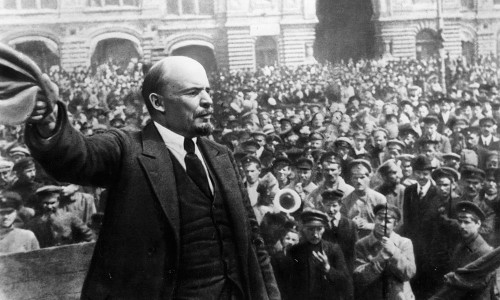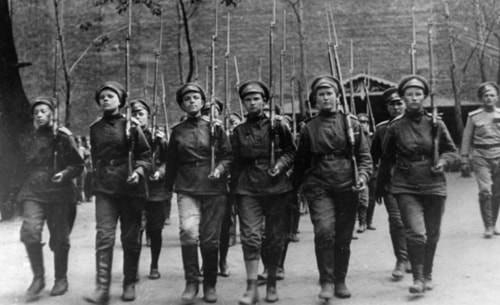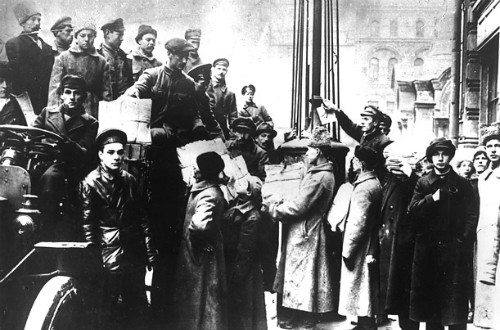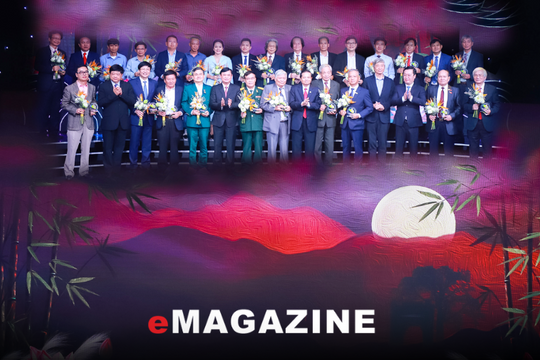October Revolution in Russia - the revolution that shook the world
The October Revolution in Russia in 1917 was a historical event that had a great impact on the development of Russia and the whole world.
 |
Vladimir Ilyich Lenin addresses the people in Petrograd in 1917. Photo: Britannica. |
November 7th is the 100th anniversary of the October Revolution in Russia,marked the birth of the Russian Soviet state. The eventThe Revolution broke out on October 24, 1917 according to the Julian calendar, led by Vladimir Ilyich Lenin and the Bolshevik Party. The revolution succeeded on October 25, 1917 according to the Julian calendar (ie November 7, 1917 according to the Gregorian calendar used today).
The revolution took place in the context of the early 20th century, Russia was an absolute monarchy, headed by Tsar Nikolai II. He pushed Russia into World War I, causing many serious consequences. The Russian Empire's economy was exhausted by the war, famine occurred in many places, industry and agriculture stagnated, and people's lives were miserable. In addition, the Russian royal family was also manipulated by "monk" Grigory Rasputin behind the scenes. Anti-war movements demanding the overthrow of the Tsar took place everywhere.
In February 1917, the February Revolution broke out with massive anti-war demonstrations and mass strikes, most notably a demonstration by 90,000 female workers from 50 factories in Petrograd, the capital of the Russian Empire (now Saint Petersburg). The movement quickly turned from a general political strike to an armed uprising. The Tsarist monarchy was overthrown.The February Revolution is considered a bourgeois democratic revolution.
At the call of the Bolshevik Party, workers and soldiers established Soviets of Deputies, representative bodies to lead the country. At the same time, the bourgeoisie also established a Provisional Government. After the February Revolution, Russia had two parallel governments led by the two forces.
The provisional government did not address the promised issues such as land reform for peasants and job creation for workers. Food shortages continued and the provisional government remained determined to continue the war.
Faced with this situation, Vladimir Ilyich Lenin, leader of the Bolshevik Party, determined that it was necessary to overthrow the provisional bourgeois government, moving from the bourgeois democratic revolution to the socialist revolution, with the slogans "All power to the Soviets" and "Peace, land, bread".
On October 24, 1917, the uprising began under the direct leadership of Lenin. The Red Guards, a volunteer armed force of workers and peasants, concentrated their forces to capture key areas, ministry headquarters, telephone exchanges, railway stations, bridges and roads. On October 25, 1917, they attacked the Winter Palace, arresting the ministers of the Provisional Government.
 |
Female soldiers marching during the revolution. Photo: Keystone. |
On the night of October 25, 1917, the Soviet government headed by Lenin was established. The first decrees passed were the Decree on Peace (condemning war) and the "Land Decree" (aimed at solving the land problem for peasants).
The Supreme National Economic Council was established to build a socialist economy. The Council was responsible for land reform: abolishing land ownership by landlords and returning land to peasants. Regarding industry, they nationalized a number of large factories and at the same time implemented advanced labor policies: an 8-hour workday, a ban on arbitrary dismissal of workers, and a vacation regime for heavy work.
The Soviet government also took measures to eliminate the remnants of the old regime such as eliminating class distinctions, church privileges, and implementing gender equality. Soviet Russia officially withdrew from World War I on March 3, 1918.
On January 10, 1918, the Third All-Russian Congress of Soviets opened, adopting a historic decision to reform the Russian Soviet Republic into the Russian Soviet Federative Socialist Republic. The Union of Soviet Socialist Republics (USSR) was then established on December 30, 1922.
 |
The Bolshevik Party distributes their newspaper to people a few days after the revolution. Photo: Keystone. |
Great influence
The October Revolution was one of the most influential events in the 20th century, marking the birth of Soviet Russia - the first worker-peasant state in the world, supporting the national liberation struggle of colonial countries. At that time, most Asian and African countries were invaded and turned into colonies by Western colonial countries. The victory of the October Revolution created an impetus for their struggle.
According to allafrica, news of the "victory of the proletariat" then spread rapidly in Africa. Inspired by events in Russia, Egypt rose up against British colonial rule in 1919.
"The October Revolution set the stage for many other countries including China, Vietnam and Cuba," commented Owei Lakemfa, a writer on Vanguardngr.
In an article commemorating the 100th anniversary of the Russian October Revolution, President Tran Dai Quang emphasized that by inheriting and creatively applying the experiences and historical lessons of the October Revolution, the Communist Party of Vietnam carried out a long and arduous revolutionary struggle and achieved glorious victory.
According to writer J. Arch Getty, professor of history at the University of California at Los Angeles, with the outbreak of the October Revolution and the establishment of Soviet Russia, a new type of state appeared in world history for the first time, along with policies aimed at the interests of workers and social justice such as women's equality, prohibition of racial discrimination, the right to work 8 hours/day, prevention of unjustified dismissal, subsidies for the elderly and the disabled, free education and health care.
Getty believes that these are policies that Western countries at the same time did not have. The birth and existence of Soviet Russia created pressure for Western capitalist countries to reform themselves, expand workers' rights and social welfare. HeLakemfa then commented that the RevolutionOctober "taught the poor, especially workers and peasants, that they too could lead the country."
According to the Communist Party of the Russian Federation, the October Revolution not only shook the world by its scale but also laid the foundation for the maintenance, stable development and progress of the world, towards ending exploitation between people, building a just society and socialism.
According to the party, by providing solutions to the challenges of the 20th century through its incarnation in the Soviet Union, the October Revolution demonstrated to the world the vitality of socialism."The October Revolution illuminated mankind's path into the era of space exploration, paved the way for the exploitation of nuclear energy and its peaceful use, and opened for all people the way forward, towards peace and progress," the statement of the Communist Party of the Soviet Union on the occasion of the 100th anniversary of the October Revolution read.
Russian President Putin sent a congratulatory message to the participants of the commemoration on November 3. He called the 1917 event an inseparable part of history. He said the revolution had a huge impact on the development of Russia and the entire world, largely defining the political, economic and social picture of the 20th century.
Geoffrey Roberts, a history professor in Ireland, said no other event in the 20th century changed the course of world history or had such dramatic consequences. The consequences, he said, are still felt today. He said the Chinese Communist Party was “the child of the Russian Revolution” and noted that last month it reaffirmed “socialist ideology with Chinese characteristics for a new era.”
"The Bolsheviks' efforts to change the world can still be recalled in the present era, when there is a growing trend of discontent with the traditional political elite,"Roberts commented.
According to VNE



